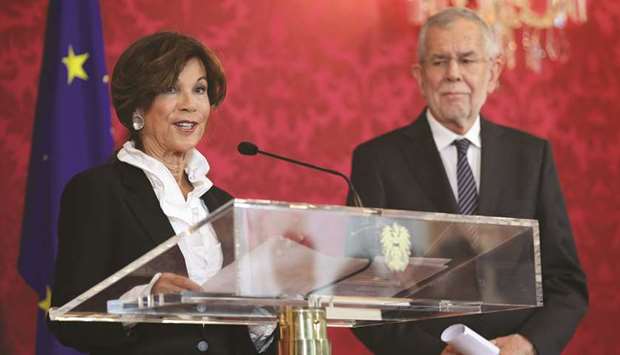Austrian President Alexander Van der Bellen has appointed the head of the country’s constitutional court as Austria’s first female chancellor to lead an interim government until elections later in the year.
Brigitte Bierlein will now be tasked with forming a cabinet after the previous government collapsed over the so-called “Ibiza-gate” corruption scandal.
“I will seek to win Austrians’ trust,” Bierlein said alongside Van der Bellen in a televised statement yesterday, saying that she would hold talks with political parties and civil society organisations in the coming days.
“The most important goal is currently to contribute to greater calm and to building trust between all (political) sides ... in Austria, in Europe and in the whole world,” she added.
She said Clemens Jablons, a previous president of the Supreme Administrative Court, was “ready to take up the posts of vice-chancellor and justice minister”.
She added that she would put forward diplomat Alexander Schallenberg for the post of foreign minister.
“If this is surprising for you, it is for me as well,” Bierlein told journalists gathered for the statement.
“I have come to know and regard Ms President Bierlein in the past years and months as a transparent, long-sighted and supremely competent person,” Van der Bellen said in announcing his choice.
Bierlein, 69, has been president of the constitutional court since last year and previously held several other prominent positions as a judge and prosecutor.
She is due to reach the court’s mandatory retirement age of 70 this year.
Her appointment comes after Sebastian Kurz became the first chancellor in Austrian history to be thrown out of office by a no-confidence vote on Monday.
Opposition MPs brought the motion as they said Kurz had to take responsibility for the scandal which brought down his government.
The crisis began with the publication of hidden-camera footage in which former Freedom Party (FPOe) leader and Vice-Chancellor Heinz-Christan Strache appeared to offer public contracts to a woman posing as a Russian investor in exchange for help in the 2017 parliamentary election campaign.
The video led Strache to resign and prompted Kurz to end his coalition with the FPOe and call snap elections.
Kurz’s centre-right People’s Party (OeVP) won an impressive 34.6% of the vote in Sunday’s European parliament elections and at the moment looks on course to easily re-emerge as Austria’s largest party at the upcoming elections.

Bierlein with Van der Bellen during the news conference in Vienna.
